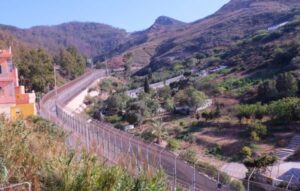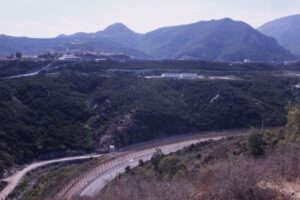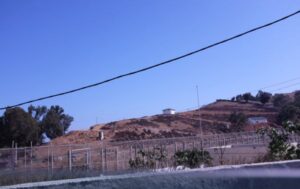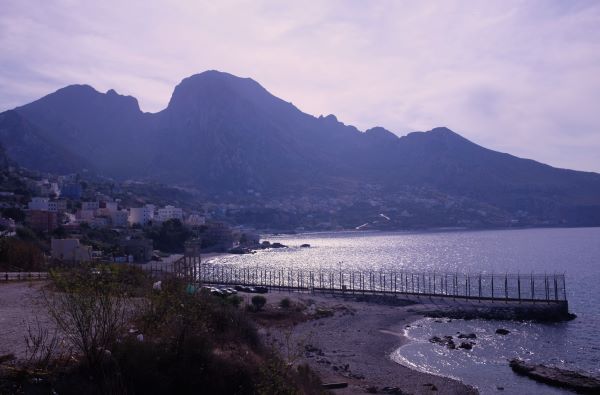by Matthias Canapini*, Unimondo**
Omar Nafi, in Nador, continues to update the association’s virtual profile, unafraid to explain the confusion and power structures. “Before 2015, migration took place exclusively by crossing the borders of Melilla and Ceuta; around 4,000 migrants managed to jump every year. Since the EU and Morocco decided to build the barrier to the north of the enclaves, migration flows have moved by sea in rubber dinghies. The number of departures has soared. From 4,000 to 59,000 in 2018. This increase in departures is a consequence of their migration policy. The question is how did this situation come about?” Morocco needed a larger flow of migrants than the 4,000 to obtain a means to put pressure on Europe, and it has succeeded: it is well rewarded politically and financially.

On Tangier’s Rue Sidi Bouabid, five hundred metres above the tourist- and merchant-packed medina, a handful of sub-Saharans play ball under the rose window of the Christian diocese. Those who are not playing dangle from the concrete bleachers, smoke cheap hashish. Meanwhile, in the city park, Maghrebians sniff glue from plastic bags. Zizu, Ivorian: “Winter is coming. Last year we lost two friends to the cold; they lived in the woods near Tangier. I have been stuck here for five years and in five years nobody has given me anything, not even a coffee. I used to live in the Masnana neighbourhood, but the situation has become unbearable. The police come, beat us, arrest us… all we have left is God and this place, which has become a kind of refuge for us migrants”. Zizu worked in a banana grove and made ends meet by making small costume jewellery tools. The civil war began in 2002 when rebel soldiers tried to remove the president from office. In 2007, both the Muslim and Christian factions signed an agreement to end the conflict, but the violence never stopped, and that was Zizu’s childhood. His father died and his mother fell ill, and at the age of 16, he left for the North to seek his fortune.
“In 2015 I tried to reach Ceuta – continues Zizu, Ivorian – but the Guardia Civil caught me and sent me to the desert. The first time in Oujda, and the second time in El-Aaiún, Western Sahara. I got out by paying the equivalent of 50 euros to the local mafia network. Three weeks ago, a friend and two companions tried to cross the Strait of Gibraltar. They had spent little on the battered dinghy, but the savings proved fatal. Another friend died during the attack on Ceuta. He was beaten so badly by the police that he woke up brain-dead. We took up a collection to send him home, but he died of a brain haemorrhage on the way. He is now buried in the red earth a few kilometres from Meknes. The police who oppress us are the same ones who turn a blind eye when necessary. All the evil in Africa, all the money in Europe. If we had enough money, we could ask to go home (you can apply for voluntary repatriation at the embassy in Rabat): empty-handed, but alive. We never sleep peacefully here; dark skin is enough to get you arrested. Often at night, Arabs armed with knives come to harass us. This leads to fights, thefts and cowardly beatings. Before landing in Morocco, many people take the route to Algeria via Niger, Gabon and Mali. In Agadez, they usually stop to work; in Dirkou (400 kilometres from Libya, a crossroads between Chad and Niger), they pass through to cross the Djanet mountains, a place of slavery and little work, but full of minefields left by the conflict between Libyans, Chadians and Nigerien rebels. Crossing the Teneré, which is entirely in the hands of the Tuareg, is difficult for everyone: sandstorms, bad food, sudden vomiting. You have to make holes in the ground to keep warm and survive the night”.

Two sympathisers unload a pan of couscous. The “bubble” remains unchanged for hours: telling stories and kicking the ball around. “It is important to know that the foyers (huts, bivouacs, shelters made up of courtyards and dormitories) are the reference points along the route of illegal immigrants. At each stop, the leaders tell you what your next stop will be, depending on your nationality. The foyer leader, even if he is a scoundrel, is an insurance policy for your journey. If you pay the passeur directly and he disappears, you will have no one to turn to, you will be alone”. says Ibrahim, 19, his ears plugged with a pair of camouflage headphones. “In the foyers, it’s like being welcomed into the family, but you have to contribute financially. Usually, for Senegalese, it is about fifteen dinars a month. We cook together, taking turns. It is a reasonable price. Other ethnic groups do not share food and everyone cooks for themselves. It is important to know that in francophone Africa, although the term is associated with clandestine journeys to Europe, “faire l’aventure” is the expression we commonly use to describe youthful wanderings, similar to initiatory paths that do not necessarily lead north. Senegalese women, for example, emigrate mainly by plane to join their husbands, who have been in Europe for years. Or they look for work in a restaurant in Nouakchott to pay their way to the Canary Islands. Sometimes,” it must be said, “they are deceived and dumped on the Moroccan coast instead of in Spain. From there, if they are unlucky, they are deported by the Moroccan police, who abandon them in the Algerian desert”.
I ask Ibrahim how it is possible to get away with such epics. How to recognise the other, how to trust. “Little by little, you learn to guess people’s intentions from their first gestures. It is a constant training. If their gaze is shifty or if they gesture too much when they come towards you, it’s best to be wary. If there is calmness, warmth and understanding in their gestures and eyes, you will probably be given a piece of bread, some dried figs or a glass of milk”.
Junior, 22, was a tailor as a child. In 2010, he left Dalaba in the KanKan region (Guinea Conakry) with his family, consisting of siblings Jordan and Jovi and parents Charlotte and Roland. I went with him to buy a ten dinar chicken. “At the time when we decided to leave Guinea, I was 12, my sister Jovi was 7 and my brother Jordan was 9. Partly on foot, and partly by bus, we reached Tangier to embark. At 3 am on 23 August 2010, we sank. Both our parents drowned with only two inner tubes from an abandoned bicycle. Two inner tubes as a life preserver, tu comprends? It was then that the Spanish navy fished us out of the sea, entrusted us to Moroccan colleagues and took us back to Rabat, to a centre for minors. Since then, we have not moved. We have been stuck in Morocco for nine years, without money or work. I never understood why they sent us back; we were very young and did not understand what was happening. The boat capsized in the strait … All around us there was only the big water of the Mediterranean”.

23 August 2010 is a forearm vein, a needle and thread to sew up the shards, a tattoo to preserve the memory. “My sister, as a minor, may have managed to get a passport, but it’s no use: repression for her too. We hide! We are afraid to go to the medina, to buy anything or just to have a good time. The locals give us dirty looks; a nod or a sideways glance is enough to call the police and risk deportation to the desert. We know we are a problem for Europe, but what can we do about it?” September 29 is designated Refugee Day, and on the confessional of the diocese Bishop Santiago has pinned up a poster of Domenico Lucano that reads “It’s not just about migrants”.
In the small crowd of fifteen migrants and twelve Moroccans, there is also Junior, praying under his breath, his eyes closed. Is this really his story? Or is it just the cold description of a terrible moment that I want to replace with a boy’s whole life? Why don’t I care what happened to him before or what will happen after? If there will be an after. Why am I sometimes morbidly bored by the details of his everyday life, the ones that make a human being what he is? I know about the shipwreck, the nine years of subtle imprisonment in Morocco and the broken dreams, but why don’t I ask Junior what his favourite colour is? That I too am a cog in the machine? To stop showing migrants is to erase the images of the drama. No more aggression, no more tragedy, no more denial of rights, no more buying borders. And what effect can telling half-told stories have? Refugee crisis or well-considered consequences? The way is black feet.
* Matthias Canapini was born in Fano, central Italy, in 1992. He travels at a slow pace to tell stories with his notebook and camera. He has published five books since 2015 and is currently a news editor and reporter for the news outlet Unimondo
** Unimondo, founded on 10 December 1998 under the auspices of the Fontana Onlus Foundation, is an online news outlet dedicated to providing authoritative content on peace, sustainable human development, human rights and environmental issues. It offers diverse and timely information, amplifying the voices of different facets of Italian and global civil society. As the Italian hub of the OneWorld network, founded in London in 1995, it is part of a global network with 11 centres worldwide and 1,600 partner associations
























